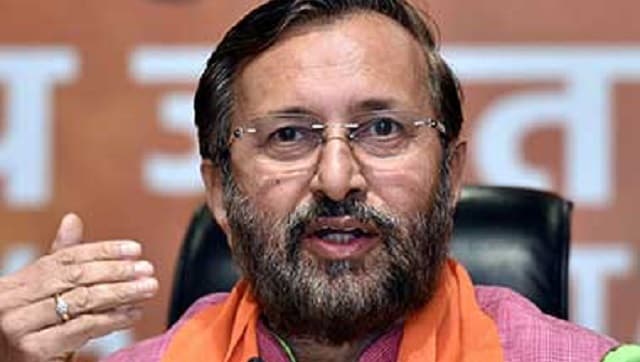No interference in press functioning, Centre tells LS as UK parliament prepares to debate press freedom in India – India News , Firstpost
The debate in UK parliament comes after a petition from Maidenhead Liberal Democrats councillor Gurch Singh, whose roots are in Ludhiana
File image of Prakash Javadekar. PTI
The government does not interfere in the functioning of the press, Minister of Information and Broadcasting Prakash Javadekar told the Lok Sabha in a written reply on Monday.
In response to a question on #PressFreedom , Centre informs #LokSabha that it doesn’t interfere in functioning of Press.@MIB_India @PrakashJavdekar pic.twitter.com/MbFCpoLxSv
— Live Law (@LiveLawIndia) March 8, 2021
Javadekar was replying to several questions posed by senior Congress leader Mallikarjun Kharge including whether it is a fact that NITI Aayog CEO Amitabh Kant had claimed in an interview in December that reforms in India are difficult because of “too much democracy”, whether the government agrees with Kant’s statement, if reports on this were “suddenly removed by all major publications” and if this move was part of any directive from the ministry to the publications.
The NITI Aayog CEO was quoted as saying, “Tough reforms are very difficult in the Indian context, we have too much of democracy. You needed political will to carry out these reforms (mining, coal, labour, agriculture) and many more reforms still need to be done.”
Javadekar in his reply pointed to an article published 11 December, 2020, where Kant stated his response was “deliberately misquoted and distorted”.
The Centre’s response comes on a day when the UK parliament is set to debate on the issues of press freedom and safety of protesters in India.
As per The Times of India, the debate in UK parliament comes after a petition from Maidenhead Liberal Democrats councillor Gurch Singh, whose roots are in Ludhiana.
The campaign has already received over a lakh signatures on the UK Parliament’s petitions website. Scottish National Party MP Martyn Day will open the debate, which is scheduled to last 90 minutes, as per the report.
“The debate will add pressure on the UK government to take this issue up with the Indian authorities, either directly or at an international level,” Singh told the newspaper. “This is a matter of human rights, the right for farmers to peacefully protest against laws that would otherwise exploit them. It’s also about allowing journalists to freely report on what’s happening. This is no different from the UK government taking a stance on protesters in Hong Kong.”
This comes just days after India was downgraded from ‘free’ to ‘partly free’ in a report by Freedom House. The US government-funded NGO, in a report released on Wednesday, has claimed that the country has witnessed a “sustained erosion of civil liberties.”
The 2021 rankings released by Freedom House, criticising Prime Minister Narendra Modi for driving India towards authoritarianism, cited a “hamfisted lockdown”, “scapegoating of Muslims” and “rising intimidation of academics and Muslims”.
India on Friday, condemned the report and called Freedom House’s rankings “misleading, incorrect and misplaced”. India further asserted that the country has well established democratic practices.
“The Freedom House report, titled ‘Democracy Under Siege’, in which it has been claimed that India’s status as a free country has declined to ‘partly free’ is misleading, incorrect and misplaced, the MIB said in a statement. Asked about the report at a media briefing, MEA spokesperson Anurag Srivastava said, “The political judgements of Freedom House are as inaccurate and distorted as their maps.”
Srivastava was referring to a wrongful depiction of India’s map by Freedom House. The MEA also took a dig at the democracy watchdog, saying india does not need “sermons”, especially from those who cannot get their basics right.
However, a report by the Rights and Risks Analysis Group (RRAG) shows that during the lockdown between 25 March and 31 May, 2020 at least 55 journalists faced arrest, registration of FIRs, summons or showcause notices, physical assaults, alleged destruction of property and threats for reportage on COVID-19 or exercising freedom of opinion and expression.
or exercising freedom of opinion and expression.
In the past decade, at least 154 journalists were either arrested, detained, interrogated or served show cause notices for their professional work and over 40 percent of these instances were in 2020, the report further stated.
Two journalists died in Uttar Pradesh in August, with one of them having been shot in Ghaziabad in front of his daughters. The other death was reported in the state’s Ballia district.
India had also slipped two ranks — from 140 to 142 in a list of 180 countries — on the global press freedom index released by Reporters Without Borders in June 2020. Responding to that report, Javadekar had said the media enjoys “absolute freedom in India and the government would “expose” surveys that portrayed a bad picture about press freedom.
With inputs from PTI
Subscribe to Moneycontrol Pro at ₹499 for the first year. Use code PRO499. Limited period offer. *T&C apply


